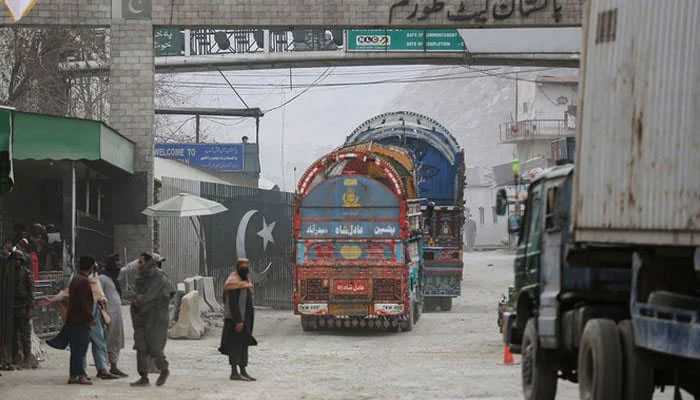Pakistan loses over Rs700bn to illegal trade annually: report
Report underscored impact of Pakistan’s economic challenges, including a high inflation rate of 25 percent
ISLAMABAD: An international report launched on Monday revealed that illicit trade in major sectors is causing a staggering loss of over Rs700 billion to Pakistan’s national economy annually, while also undermining the profitability of the formal sector.
The report, presented by Jeff Hardy of the Transnational Alliance to Combat Illicit Trade (TRACIT), highlighted how illicit trade contributes to corruption, money laundering, and tax evasion in Pakistan.
During the report’s launch event, hosted by the Policy Research Institute of Market Economy (PRIME), policy recommendations were presented to government and industry stakeholders. The report underscored the impact of Pakistan’s economic challenges, including a high inflation rate of 25 percent. The steep rise in prices has severely impacted consumer purchasing power, driving the demand for illicit goods.
“Record high inflation exacerbates the problem,” stated TRACIT Director-General Jeff Hardy. “When prices outpace incomes, consumers turn to illicit products for cheaper alternatives,” he added.
Dr. Ali Salman, Executive Director of PRIME, emphasised that high taxes and tariffs fuel a $68 billion black-and-grey market in Pakistan, exacerbated by soaring inflation. The report identified key sectors affected by illicit trade, including food fraud, illicit pesticides, counterfeiting, and trade in substandard pharmaceuticals. Approximately 40 percent of medicines in Pakistan are estimated to be counterfeit or substandard.
Efforts to curb illicit trade in pesticides have shown promise, with recent government seizures and initiatives by the Department of Plant Protection. Cigarette smuggling is rampant, with over half of cigarettes sold in Pakistan evading taxes, leading to annual revenue losses of USD 860 million. Strengthening enforcement and track-and-trace systems can help mitigate tax evasion.
Counterfeiting, previously dominated by imports, has seen a surge in local production, exacerbating the issue. A comprehensive approach to tackling counterfeiting is essential for Pakistan’s economic revival.
Mr. Hardy emphasised the need for robust enforcement against smuggling, money laundering, and tax evasion, which have plagued Pakistan’s economy for years. Tax evasion amounts to six percent of GDP, with illicit trade in various sectors contributing significantly. Enhanced enforcement and tax collection mechanisms are vital for economic stability and debt sustainability. Tracit and Prime signed an MoU to collaborate in combating illicit trade, including conducting in-depth investigations into its impact on the Pakistani economy.
-
 Pamela Anderson, David Hasselhoff's Return To Reimagined Version Of 'Baywatch' Confirmed By Star
Pamela Anderson, David Hasselhoff's Return To Reimagined Version Of 'Baywatch' Confirmed By Star -
 Willie Colón, Salsa Legend, Dies At 75
Willie Colón, Salsa Legend, Dies At 75 -
 Prince Edward Praised After Andrew's Arrest: 'Scandal-free Brother'
Prince Edward Praised After Andrew's Arrest: 'Scandal-free Brother' -
 Shawn Levy Recalls Learning Key Comedy Tactic In 'The Pink Panther'
Shawn Levy Recalls Learning Key Comedy Tactic In 'The Pink Panther' -
 King Charles Fears More Trouble As Monarchy Faces Growing Pressure
King Charles Fears More Trouble As Monarchy Faces Growing Pressure -
 Inside Channing Tatum's Red Carpet Return After Shoulder Surgery
Inside Channing Tatum's Red Carpet Return After Shoulder Surgery -
 Ryan Coogler Brands 'When Harry Met Sally' His Most Favourite Rom Com While Discussing Love For Verstality
Ryan Coogler Brands 'When Harry Met Sally' His Most Favourite Rom Com While Discussing Love For Verstality -
 Sarah Pidgeon Explains Key To Portraying Carolyn Bessette Kennedy
Sarah Pidgeon Explains Key To Portraying Carolyn Bessette Kennedy -
 Justin Bieber Rocked The World With Bold Move 15 Years Ago
Justin Bieber Rocked The World With Bold Move 15 Years Ago -
 Sam Levinson Wins Hearts With Huge Donation To Eric Dane GoFundMe
Sam Levinson Wins Hearts With Huge Donation To Eric Dane GoFundMe -
 Kate Middleton Steps Out First Time Since Andrew Mountbatten-Windsor's Arrest
Kate Middleton Steps Out First Time Since Andrew Mountbatten-Windsor's Arrest -
 Inside Nicole 'Snooki' Polizzi's 'private' Marriage With Husband Jionni LaValle Amid Health Scare
Inside Nicole 'Snooki' Polizzi's 'private' Marriage With Husband Jionni LaValle Amid Health Scare -
 Germany’s Ruling Coalition Backs Social Media Ban For Children Under 14
Germany’s Ruling Coalition Backs Social Media Ban For Children Under 14 -
 Meghan Markle Shuts Down Harry’s Hopes Of Reconnecting With ‘disgraced’ Uncle
Meghan Markle Shuts Down Harry’s Hopes Of Reconnecting With ‘disgraced’ Uncle -
 Liza Minnelli Alleges She Was Ordered To Use Wheelchair At 2022 Academy Awards
Liza Minnelli Alleges She Was Ordered To Use Wheelchair At 2022 Academy Awards -
 Quinton Aaron Reveals Why He Does Not Want To Speak To Wife Margarita Ever Again
Quinton Aaron Reveals Why He Does Not Want To Speak To Wife Margarita Ever Again




